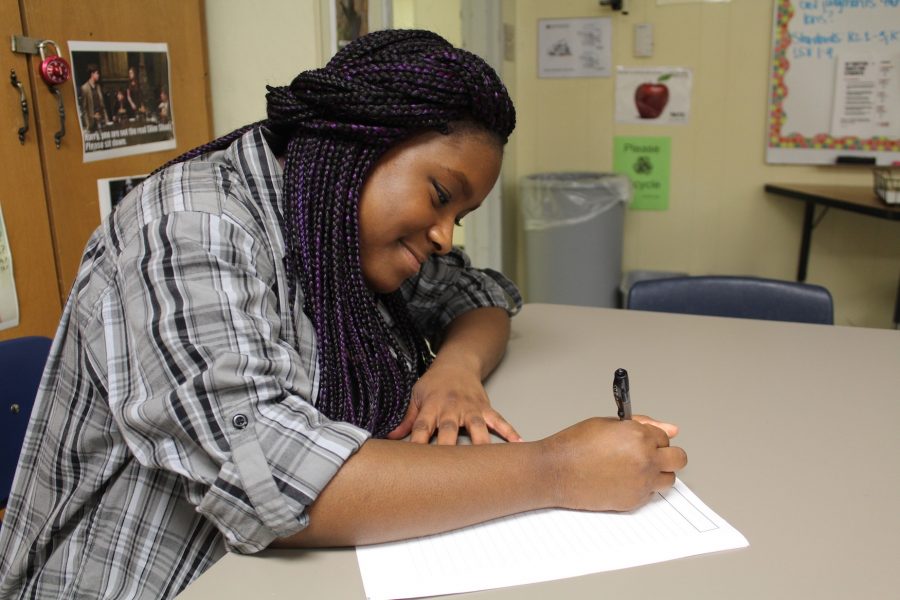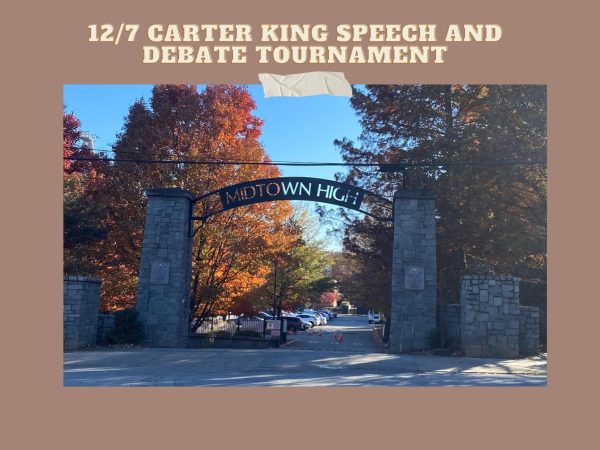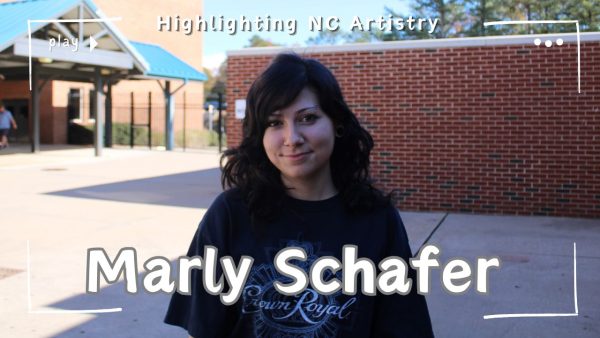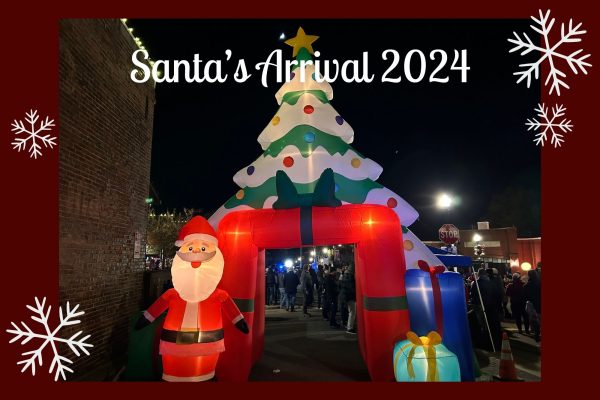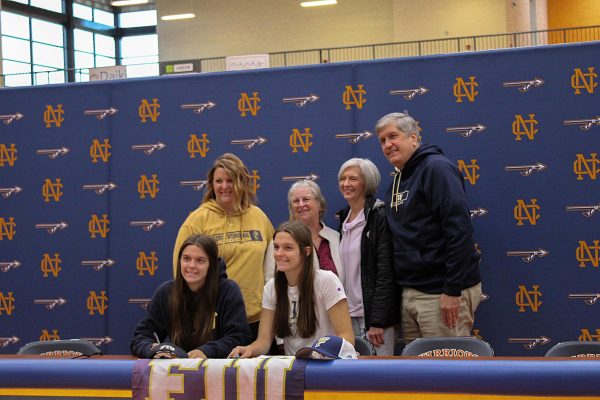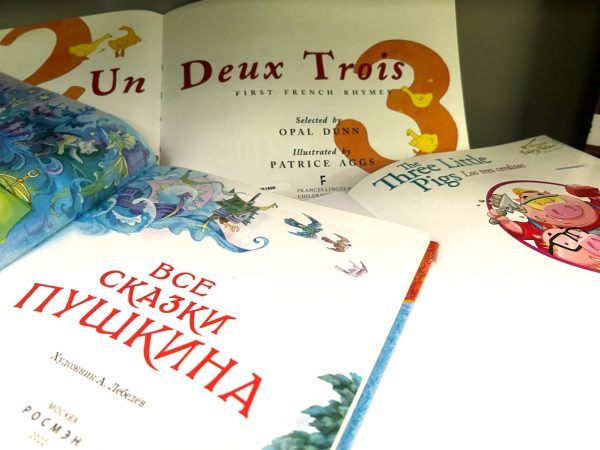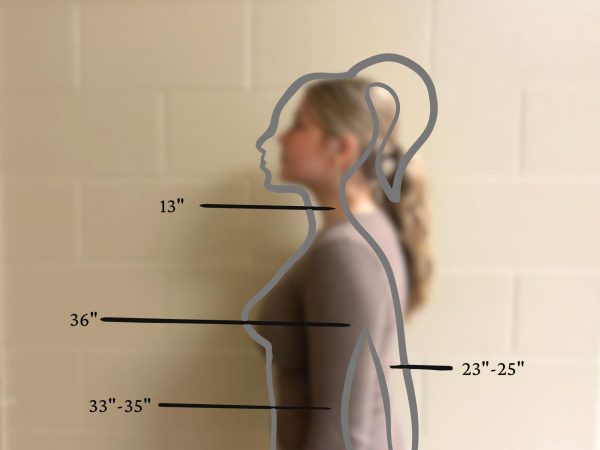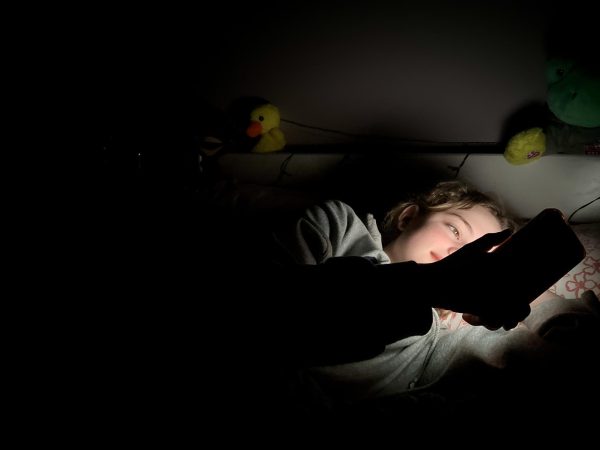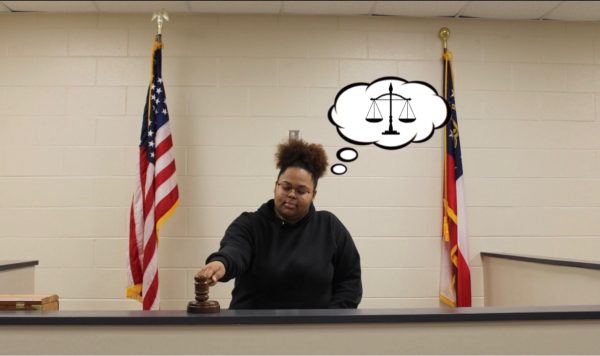An insight into the tedious, emotional GHP process
Junior Imani Bryant practices writing an essay like she must at the Governor’s Honors interview for county and state.
Every year over 3,000 students apply to attend Georgia’s prestigious Governor’s Honors Program (GHP), a four week summer enrichment program at Valdosta State University. Applicants go through four different interviews on a journey that starts in September and does not conclude until the next March. Three students trying out for Governor’s Honors through their entire journey were followed to examine the effects of the process on prospective attendees.
At the beginning of the school year, teachers nominate students in one of eleven subject areas, ranging from Communicative Arts to Science to Music Performance. They must pass a departmental, school, county, and state interview. After passing the county interview, students must apply for state interviews, which not every student receives. Starting at the county level, certain subject areas also require extra qualifications, like essays or simulations.
For students gifted in academic or artistic fields, GHP provides an opportunity to share a passion and spend almost half of the summer expressing it. Nominated candidates represent well-rounded students with a shining talent for a subject area or fine arts discipline.
Junior and pianist Audrey Widmier decided to try out to deepen her experience with the instrument. “GHP will help me meet more students who are as passionate about piano as I am. It will also introduce me to more teachers I can learn from, giving me the most experience. I have been playing piano for almost ten years and it is a big part of my life, so why not do something more with it,” Widmier said before the first interview.
Academic students’ passion for their subject area fuels them to try out.
“I tried out for Communicative Arts because writing and English are my passion,” junior Imani Bryant said. “I fell in love with the written word years ago, and I wanted to do something that pertains to that. I love how human beings have strung together seemingly random symbols and sounds to make something so beautiful and meaningful. Creating literature is the collective soul of humanity, and I just love being a part of that.”
The promise of like-minded people and the diversity of the program also excites candidates.
“I am most excited to be surrounded by students who are as motivated and passionate in Social Studies as I am,” junior Josh Joines said. “It’s an opportunity to to see viewpoints from people from all parts of the state, which is very exciting. The idea that what we do today will affect generations to come drives me to learn more about politics and the interconnections between all the countries of the world and explore that diversity of viewpoint.”
The Start of a Journey
Applying to GHP starts with a teacher nomination in September.
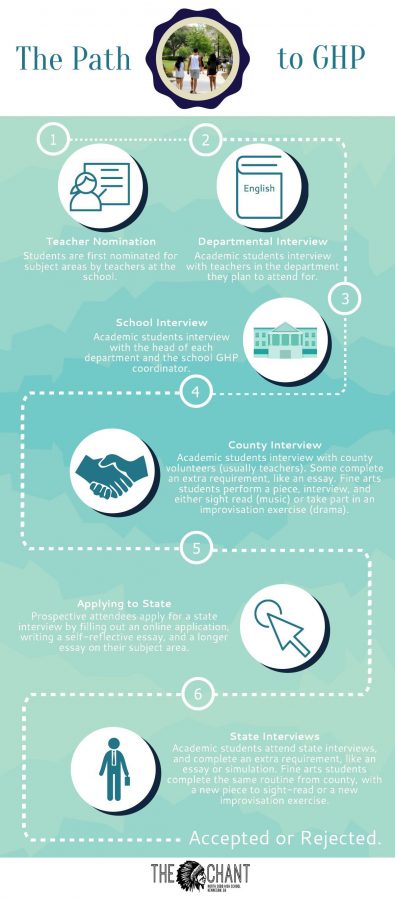
The path to a GHP nomination borders on the excruciating, with four different interviews.
“If I nominate somebody then it would be someone that’s a stand-out in terms of comprehension of the subject,” AP US History teacher Tamara Rankenburg said. “They’re at a level that’s higher than everybody else and they can understand it at a deeper level. But also someone that can talk and share the information for themselves as well.”
Academic students then attend a departmental interview with the heads of their prospective subject area. Students trying out for fine arts proceed straight to the county level.
The departmental interview provides applicants with their first experience of the process and causes bouts of nerves.
“Going into the departmental interview I was very nervous and I thought it showed on the first question. But after that I calmed down and the rest of the interview went well. I was nervous coming out because I thought the flub on the first question might have blown it,” Joines said after his departmental interview.
Even though students do not know the path ahead, most try to prepare for the first interview by practicing example questions.
“I did a lot of practice interviews with my parents. They were super helpful in preparing for that first interview. It was just getting over the nerves,” Bryant said.
When students pass the departmental interviews, they move on to the school level. Applicants interview with the heads of every academic subject area and the school nominates, at the maximum, one student for every one hundred in its population.
As the stakes increase through the interviews, the nerves increase as well.
“I felt so nervous for the school interview,” Bryant said after her school interview. “I was crying internally most of the morning. But when I came out I felt like the whole thing went pretty well. I knew most of the teachers who interviewed me, so I felt pretty confident about it. I really hope I make it all the way, and now I feel like I can.”
After just the school interview, prospective attendees understand the process and know how to best tailor their skills and show off their passion.
“The experience has been great so far,” Joines said shortly after his interview. “It has allowed me to talk about things I am passionate about and has allowed me to go through the interview process, which will be useful outside of GHP and school. Now I know what to do and what not to do, which can translate into the real world.”
Increasing Stakes
After the departmental and school interviews, students move on to the county interviews, which, for Cobb, take place at Sprayberry High School. Teachers from the county volunteer to administer the interviews and students complete the previously mentioned extra requirements.
Fine arts students start their audition process at county. They prepare a short piece of music or a monologue, as well as participate in an interview. Music students also sight read a piece and drama students participate in an improvisation exercise.
Despite the nerves of auditioning, the process allowed students to receive feedback on their performance and practice what they love.
“I was worried that they would ask me a question I wouldn’t know the answer to, like a piano trivia question,” Widmier said after her interview. “Once I took my last breath before playing, the biggest worry on my mind was if I would accidentally play the wrong notes or even the wrong song! But I just played like I do when I’m practicing at home or in the orchestra room. All my worries dissolved once I played the first chord. It was a beautiful piece and I just poured all my worries and emotions into the playing instead of letting it build up in my mind.”
For academic students, the county interview introduces them to interviewers they do not know and the new challenge of expressing their passion.
“The county interview was different from the other interviews so far because I did not know the people interviewing me. It was also more focused on the questions about Social Studies and my opinion on them than it was questions about myself,” Joines said.
The added pressure of an essay for Communicative Arts candidates meant applicants must showcase their talent for the English language.
Looking back on the experience after her county interview, Bryant explained how the chance to share her writing impacted her: “It’s been a roller coaster ride, honestly. It’s made me believe that writing is something I could do as more than a hobby. I almost never share my writing because I felt like it was a fool’s errand, something that wouldn’t take me anywhere, but now I feel like it something I could do as a possible profession.”
The Big Leagues
Students who pass through the county level interviews apply for state interviews. Georgia introduced the process of applying for the interviews in the 2014-15 school year. Academic students must earn their place at state by completing an application, including a short self-reflective essay and a longer essay on their subject area. Fine arts students trade in the long essay for a video performance sent to the judges.
For Bryant, applying to state allowed her to further investigate the art of writing.
“I had to write an essay comparing two pieces of literature that I had never had the chance to compare before and that was so broad it scared me at first,” Bryant said. “It took me like two weeks to come up with what I was going to write about. I ended up writing about Maya Angelou and Langston Hughes because we very rarely ever look at African-American authors in school and they are two of my favorites. It was nice to write about something I felt very passionate about.”
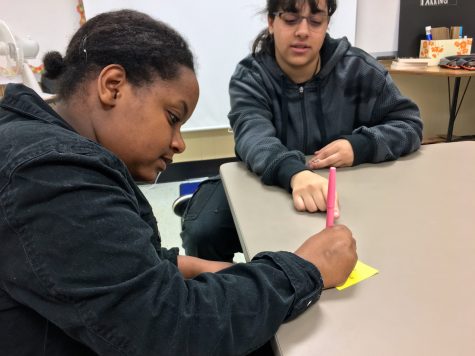
Junior and Social Studies major Bethel Mamo works with Governor’s Honors alumna, Fatima Elfakahany (Communicative Arts), to plan a list of items to bring to the camp. Mamo received her acceptance on March 25, 2016 and looks forward to the program. “I want to learn more than I would be able to at school, like on topics I wouldn’t get in normal classes. I am excited to be able to actually understand more content and know more in depth than I would regularly,” Mamo said.
With applying to state comes new fears and anxiety, like lacking the magic touch.
“Just the fact that I don’t really do anything Social Studies-wise outside of school scared me. I didn’t think I was really as qualified as the other candidates. Also, at this point in the game it’s just so competitive and I’m expecting the state interviews to be more intimidating, but I think I am up to the challenge,” Joines said.
State interviews took place at Pebblebrook and Luella High Schools on February 13, 2016. As the final stretch for candidates, the interviews brought with them nerves and anxiety. After completing the interview and any extra requirements for their subject area, though, students came out feeling positive.
“We got there and we were all visibly nervous,” Joines said. “As part of my interview, I debated with 14 other candidates for about 15 minutes with randomly assigned political parties and states. It was a lot of fun and it really showed if you could debate or not. I felt really confident coming out of that. Then my interview was also very positive, so I came out really excited about the experience.”
Applicants received word of their acceptance or denial almost a month later, on March 25, 2016. The joyful news of acceptance came as a shock for students who made it to GHP.
“It was the same day as a Model UN conference I checked my email right after,” Bryant said. “I opened it and the first word was ‘congratulations.’ I just sat down and cried right there. I was so excited and happy. The whole way back I was just trying to calm down and come off of this high but I couldn’t. It was amazing.”
For others who did not make the cut, disappointment reigned.
“I wasn’t really surprised that I didn’t make it because I know that piano is a very competitive subject to make it in. At the same time, I was sad and kind of disappointed, though, because I worked hard for the audition,” Widmier said after hearing the news.
A Summer of Possibilities
For Joines and Bryant, who both made it to GHP with one other junior from North Cobb, their summer will consist of a month full of new experiences, interesting courses, and meeting other talented students. Still, they look back on the audition experience as a helpful segue into the program.
“Being able to get through an interview process, like I have with GHP, is really valuable. Even if I hadn’t made it, I got to go through four intensive interviews which is useful throughout the rest of my life. You have to interview for a lot of things in life so now I have experience,” Joines said.
Both Joines and Bryant agreed that the waiting between each audition made the experience nail-biting.
“That month of waiting between the state interview and getting the email was terrible by far. It was the worst month ever and I was so nervous and anxious about the process the entire time,” Bryant said.
Even though she did not progress to the program, Widmier also looked back on the experience fondly.
“I think that the experience with auditioning will help me with any future auditions or interviews. It was really interesting because this was my first real audition on piano too. This audition isn’t the last hope and can help considerably for my future, even though I didn’t get through,” Widmier said.
The process also allowed students to become more in touch with their subject areas and develop their passions.
“It’s definitely made me more open to how big Communicative Arts is,” Bryant said. “I knew it wasn’t just literature and writing, but now I feel like it’s so much more. It’s all forms of media. I’m really excited to further develop my knowledge of communicating and see how everyone else approaches it.”
The true love for a subject area or fine arts discipline that applicants share in their interviews sets gifted students apart from their peers. By overcoming the hurdle of interviews, every candidate received valuable experience and expressed not just talent, but love.
“I think the interview was so much showing your passion,” Joines said. “That’s what they told us over and over again. That’s what they were looking for beyond everything else. They want someone with a true love for their subject area because those are the kinds of people who will go to GHP and thrive.”
For tips from past attendees, check out The Chant’s article here. For a photo journal chronicling the program from inside, check out The Chant’s article here.
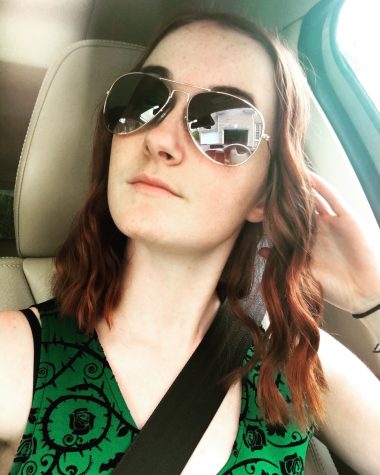
Katherine Shambaugh currently serves as Copy Editor and Photo Editor for the North Cobb High School news website The Chant.
Kat, a senior in the International...



